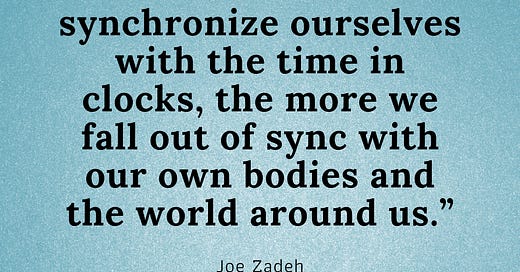In my most recent newsletter, I shared about how I had embraced some limiting beliefs about age and societal timelines. After doing some deep work with a coach, I was able to recognize how these cultural attitudes had limited possibilities for my life. Interestingly, I just came across a relevant article that dives deeper into the concept of time itself and how it can limit us.
In “The Tyranny of Time” by Joe Zadeh, the writer explores the history of how humans created clocks to measure time and, eventually, monetize it. For our ancestors, the concept of a clock would have been completely foreign. Their time was dictated by nature and its movements, not a British observatory clock that dictated the “official” time for the world.
Granted, having a uniform time has allowed for much progress. We can better coordinate on small and grand scales and be specific about meetings and deadlines. In many ways, it was served humanity well. But as Zadeh notes, “The more we synchronize ourselves with the time in clocks, the more we fall out of sync with our own bodies and the world around us.”
This is an important reminder as conscious leaders grapple with the productivity obsession that grips the workplace. Burnout, overwhelm, stress, and attendant health issues are on the rise and everyone wants to know how to fix it while not capitulating on profits and productivity.
What Zadeh shares in his article presents an important concept for conscious leaders looking for a solution: don’t embrace manmade concepts like clock time, just because it’s the norm.
Too often we let long-held societal norms, even fundamental ones like clock time, dictate what is possible for us. But Zadeh challenges the concept that manmade clock time is some type of universal law that cannot be changed:
“Much like has happened with money, the clock has come to be seen as the thing it was only supposed to represent: The clock has become time itself.”
“Clock time is not what most people think it is. It is not a transparent reflection of some sort of true and absolute time that scientists are monitoring. It was created, and it is frequently altered and adjusted to fit social and political purposes. Daylight savings, for instance, is an arbitrary thing we made up. So is the seven-day week.”
It seems illogical to question something like the concept of manmade clock time since it works so well. But when conscious leaders are looking to change the world for the better, we need to set aside “the way things are” and manmade concepts like clock time.
It doesn’t mean chucking the watch from your wrist or removing the batteries from your wall clock. But it does mean looking at things from a completely different perspective if we want to solve big, seeming intractable societal problems.
Zadeh notes, “Perfection is a manmade concept; nature is irregular.”
What if conscious leaders started being okay with thinking in a more natural, imperfect way? A way that syncs more closely with nature, and in the process brings us back to a more balanced approach to work and life. What could we accomplish once we embraced this perspective?
The bottom line is even concepts like clock time can be a limiting belief if we let it become one. It’s okay to think outside the clock to create work and life that benefits us and our teams. Nature is timeless and abundant; the only limitations are the ones we place on ourselves.
Work happy. Live happy. BE happy.
Meredith
The way we work and build teams is rapidly changing. Leaders often feel unprepared to navigate the transition. As a conscious leadership coach, consultant and communicator, Meredith helps leaders and their teams create new ways of working and relating so they can prepare for the future by consciously co-creating it.
Contact her to develop your conscious leadership and transform your organization into the workplace of the future.
You can support my work developing more conscious leadership in the world by investing in a paid subscription to this newsletter. Upgrade your subscription today!
Connect with Meredith on Instagram, Facebook, Twitter, and LinkedIn for content related to these topics.



